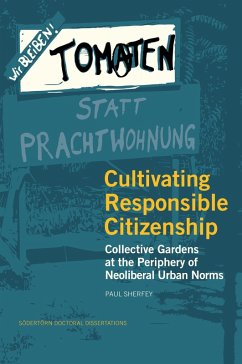Changes in the urban landscape do not go uncontested, however. The rise of collective gardens is one example of collective action where people challenge dominant rationales of urban land use. These gardens emphasise collective management and publicly-oriented educational and cultural programming. They are also places where alternative norms of urban life are nurtured. What are these alternative norms, how are they nurtured, and what does this tell us about contemporary experiences of urban life in the context of neoliberal capitalism? Here, the material cultures of collective gardens in Sweden and Germany are analysed, turning then to individual case studies to explore collective and institutional narratives about them. Engaging with multiple perspectives on the construction of their meaning and relevance as places of political activity, this study examines how collective gardens manifest an ethos of democratic citizenship. Furthermore, it shows how different interpretations of responsibility result in collective gardens that both resist and contribute to neoliberal capitalist objectives.
Hinweis: Dieser Artikel kann nur an eine deutsche Lieferadresse ausgeliefert werden.
Hinweis: Dieser Artikel kann nur an eine deutsche Lieferadresse ausgeliefert werden.








